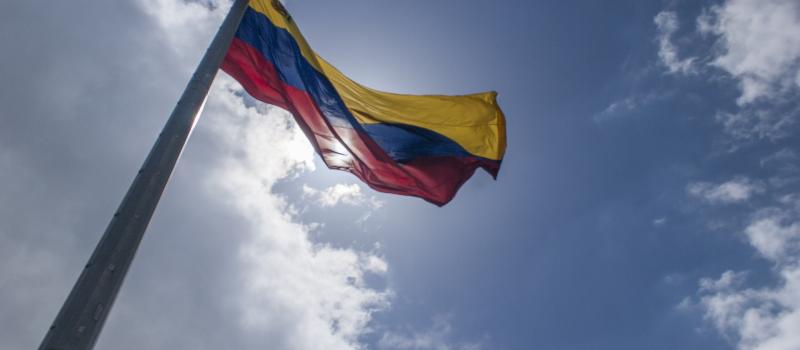China, Russia Increase Leverage in Venezuela Amid Crisis
posted by R. Evan Ellis on September 8, 2017 - 9:16am

This report was originally published by NEWSMAX.
The most important question regarding the unfolding crisis in Venezuela is not whether U.S. sanctions and international pressures will force its populist regime to restore democracy. That will not happen anytime soon. Rather, it is whether the Venezuelan regime will be able to successfully transition power to a more rationally managed authoritarian government, backed by Russian and Chinese resources, that protects those who have systematically looted the country, while providing a sufficient façade of democratic process and compromise that a weary and distracted international community lends it legitimacy.
As the crisis in Venezuela has deepened, Russia and China have leveraged the Maduro regime’s growing international isolation, financial needs, and political receptivity, to increasingly control the country’s finances, oil, and markets. While Russian and Chinese companies in fact compete with each other in Venezuela in these areas, their strategic and business interests arguably coincide in the survival of an anti-U.S. regime in close proximity to the U.S., granting its benefactors privileged access to the country and its petroleum and mineral wealth.
Of the two extra-hemispheric actors, it is the PRC which holds the greatest leverage over the fate of the Venezuelan regime, particularly as its access to conventional financial markets and oil sales are reduced by U.S. sanctions. The PRC has the money to lend, and indeed has already lent an estimated $60.2 billion to the regime during the past decade. In addition, the PRC controls the financial instruments in Venezuela key to the regime’s survival. China’s CITIC bank currently manages PdVSA’s current accounts for its oil transactions, after the latter moved them from Portugal’s Banco Espiritu Santo (BES), probably to protect those accounts from claimants in lawsuits against the company. More importantly, China Development Bank manages the principal lines of credit for Venezuela’s “loans-for-oil” contracts, and thus controls the regime’s main vehicle for obtaining consumer goods for its supporters, and resources for building the petroleum, electricity, and transport infrastructure that the regime requires to bring the considerable deposits of heavy oil in the Orinoco tar belt and bring it to market, so as to pay its bills. During a recent meeting of the China-Venezuela High-Level Mixed Commission, the two nations signed 22 agreements involving $2.7 billion in projects, including construction of the Jienyang refinery to process Venezuelan heavy oil in the PRC.
While the PRC has been in talks with individual members of the Venezuelan opposition, China neither needs to turn against the current Venezuelan regime, and indeed, it is strongly in its interest not to do so. Because most Chinese loans to Venezuela over the past decade have been short-term and repaid on time, and because China has become stingier with credit as the Venezuelan crisis has deepened, its outstanding debt exposure in Venezuela may be as little as $10-20 billion, hardly worth risking its relationship with a strategically useful regime sitting on top of 300 billion barrels of recoverable oil. Moreover, the recent successful seating of the Venezuelan constituent assembly raises the possibility that the regime could reform the constitution, permitting it to hand over even greater portions of Venezuela’s oilfields and other assets, in return for needed cash.
Like China, Russia will also continue to support the Maduro regime or its replacement, for the same reasons as the PRC will, albeit with more limited resources and fewer financial and commercial instruments for doing so. In the oil sector, while the more commercially-oriented Russian oil firms such as Lukoil have long-since pulled out of Venezuela, the state-owned firm Rosneft, led by former Russian senior intelligence operative and sometimes Putin ally Igor Sechin, has sunk an estimated $6 billion into the country since 2010, including over $1 billion in 2017 alone.
As other companies have pulled out of Venezuela, Rosneft has negotiated to leverage Venezuela’s need for cash to gain expanded stakes in oil joint ventures such as Petromonogas, Petrovictoria, and Petromiranda. Indeed, as the U.S. has signaled that it could block Rosneft’s inheritance of the downstream petroleum company CITGO (in which it obtained a 49 percent stake in exchange for a $1.5 billion infusion of cash to PdVSA), Rosneft has been holding talks with PdVSA to swap the vulnerable asset for claims to yet more Venezuelan oil blocks.
As the situation in Venezuela deteriorates, both Russia and China are playing a delicate game. While both have a strong interest in providing resources to ensure the continuation of a friendly, anti-U.S. regime in Caracas, their resources are not infinite. In addition, each must move cautiously to avoid that the United States perceive hostile intent in their maneuverings in Venezuela, and attempt to block them. Moreover, both extra-hemispheric actors must use their leverage to advance a transition of power in the country toward a leadership at least minimally capable of managing the Venezuelan economy and oil sector in a sustainable fashion. Yet they must not pressure the regime so hard that it collapses, and the transition must give a sufficient appearance of legitimacy and legality so that the U.S. and international community accepts the domination over Venezuelan assets that Russia and China achieve.
The U.S. is right to impose escalating sanctions on Venezuela, yet as they do so, they must also deny Russia and China from leveraging their position as an alternative source of capital and support, to expand their own positions in the country. One of the few worse problems than a hostile, unstable Venezuelan regime flirting with Russia and China, is a hostile, stable one economically and politically dominated by them.

